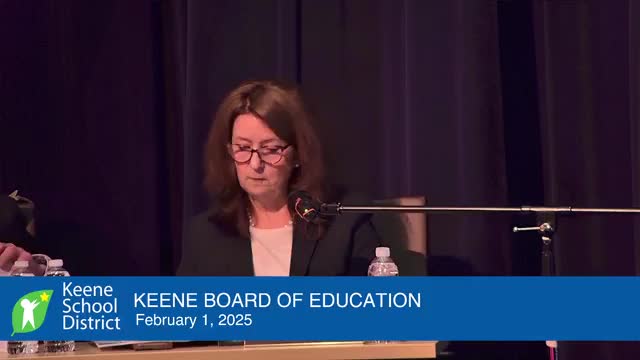Keene voters keep proposed $79.1 million school budget after rejecting $250,000 special-education amendment
Get AI-powered insights, summaries, and transcripts
Subscribe
Summary
At the Keene School District first session, voters rejected an amendment to add $250,000 for special-education staffing and approved the board’s $79,100,705 operating budget for the March warrant. Public commenters, teachers and administrators debated caseload versus workload and whether cuts had already been restored by the board.
Keene voters at the school district’s first session on a winter morning voted to place the board‑approved $79,100,705 operating budget on the March warrant after rejecting an amendment that would have added $250,000 for special‑education staffing.
The amendment was proposed by Jennifer Kiernan, a Keene resident and special educator, who moved to “add money back in $250,000 to the proposed budget, making the total $79,350,705.” Eric Murphy, a Keene resident, seconded the motion. After discussion and a show-of-hands count, the amendment failed, 14 in favor and 31 opposed. The main warrant article as presented by the board was then accepted for placement on the March ballot.
The vote followed an extended public discussion focused on special-education staffing levels and how the district measures need. The board presented the budget as an approximately 3 percent increase for fiscal year 2025–26 from the prior year and explained the district’s default budget option if Article I were defeated. The warrant packet lists the Article I request as $79,100,705 and states the default operating budget would be $77,683,980.
Why it matters: the amendment debate highlighted a recurring community concern about special‑education caseloads and whether the district should move from a caseload model to a workload model to set staffing. The hearing drew teachers, parents and district staff who urged different approaches to staffing and to measuring student need before the March vote.
Board presentation and budget details Jacqueline Headings, presenting the Article I materials for the Keene Board of Education, reviewed the packet and highlighted the district’s prior public hearings and budget committee reviews. The board materials break down cost centers by school, list revenue sources including local and state property tax aid, and calculate tax impact for homeowners. The board indicated the operating budget proposal would increase the tax impact by about $109.46 per $100,000 of assessed value (presented as $109.46 per $100,000) and summarized a non‑property‑tax revenue change shown as minus $206,216 in the packet.
Public and staff testimony Several speakers urged restoring the $250,000 for special‑education positions. Kiernan, who identified herself as a special educator, described high caseloads and cited difficulty finding certified specialists. She said cutting a recently converted paraprofessional position was “especially painful” because the person was pursuing certification and had been mentored by existing special educators.
Opponents of the amendment cited the board’s prior actions and declining enrollment. George Downing, Chair of the Keene School Board, said, “This is the same conversation that we had last year,” and noted the board and administration had previously added positions during the year when needs changed and positions could be justified. Several speakers, including Nick Germana and others, urged the public to consider shifting to a workload‑based staffing model but expressed skepticism that simply adding funds on the floor would guarantee those dollars would be used for the positions speakers hoped for.
District leaders’ response Tim Rohrer, representing the district administration, said principals received the resources they requested and that the board had added positions beyond the administration’s baseline request. “Every principal had everything they requested funded,” Rohrer said during discussion, emphasizing that the proposed amendment would be an addition beyond what building leaders included in their requests. Superintendent Robert Malay clarified district special‑education counts, saying the percentage of students identified for special education had risen because overall enrollment is declining, and that absolute special‑education head counts had not increased.
Procedure and outcome After public comment, the moderator called for a voice vote on the amendment and, because the result was not clear by voice, directed a show‑of‑hands count. The amendment—adding $250,000 to bring the total to $79,350,705—failed, 14–31. Shortly afterward, the meeting approved placing the board’s original Article I amount of $79,100,705 on the March 11 ballot.
Next steps The district reminded voters that the second session vote will occur on Tuesday, March 11 at the Keene Recreation Center (7:30 a.m.–7 p.m.) and that absentee ballots are available at the central office on Maple Avenue. If Article I is defeated at the ballot session, the warrant materials explain steps for reverting to the default budget or for calling a special meeting in accordance with statutory provisions.
Ending Residents and board members stressed continuing discussion on how to measure and staff special‑education need before the March vote, with several speakers asking the district to explore workload models and to be transparent about how any additional dollars would be allocated.
